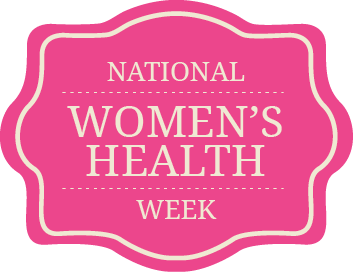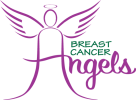Educate, Celebrate, Donate: Women’s Health Week May 9th Through May 15th

We’ve come a long way since the days when women’s health issues were not discussed in “polite” company. Today, health risks like breast and cervical cancer are at the forefront of preventive medicine and are no longer taboo topics. We can freely dicuss the choices we make around sexuality, gender, and child-bearing and find support in the media and our local communities. And we have whole weeks and months devoted to educating men and women alike on women’s health issues. October is Breast Cancer Awareness Month, which was first celebrated in 1986. January is Cervical Health Awareness Month. And Women’s Health Week, which will be celebrated from May 9 through May 15 in 2021, joins a growing series of public health education events.
What’s in a date? It turns out that marking the calendar is one of the most powerful tools available to medical and social advocates. Events like Women’s Health Week not only raise awareness, but millions of dollars to help prevent illness and reduce the suffering of women who do fall ill. At Breast Cancer Angels, we encourage our community to help promote these designated dates through social media, conversations with other women, and by urging local governments to do their part and participate. If you have a few dollars in your purse and can make a donation, all the better. And please, wear your ribbons and share your stories of hope, which can mean so much to cancer patients and survivors.
What’s on The Agenda for Women’s Health Week 2021?
Women’s Health Week takes a broad-brush approach to educating women on health risks ranging from diabetes to heart disease to, more recently, COVID-19. These are equal opportunity diseases, of course, in the sense that they affect both men and women. But when we look at who’s actually accessing healthcare in the US, there are social and economic disparities. Poor women and women of color are less likely to seek and receive preventive care and diagnostic services. Often, they receive too little care too late. Black women are more likely to be diagnosed with advanced-stage breast cancer than their white sisters, for example. Among other goals, Women’s Health Week seeks to correct these disparities. The event encourages all women to take control of their health by making medical care and lifestyle changes that reduce health risks. Women’s Health Week increases awareness of the regular screenings that can minimize the severity of health problems ranging from depression and obesity to osteoporosis to cancer.
Do All Women Need the Same Health Monitoring?
The short answer is no. Depending on your age, your family medical history, your sex life, and a number of other factors, your physician will recommend a personalized health monitoring plan for you. Over the years, you’ve probably heard that everyone should get an annual physical exam. But more recent guidelines have relaxed these rules for people who generally feel healthy. If you’re in your twenties or thirties, an exam every two to three years may be all that’s necessary.
Once you reach your fifties, the medical community recommends an annual physical exam, regardless of whether you’re experiencing any symptoms. Physicians also recommend certain screenings and immunizations at certain intervals in your life. It’s crucial for women who are sexually active to receive the human papilloma virus (HPV) vaccine, but some doctors recommend routine vaccination as early as age eight, for both boys and girls. Bear that in mind if you have kids. Exposure to HPV puts unvaccinated women at greater risk for cancer of the cervix, vagina, mouth, and anus, as well as other ailments such as genital warts.
If you plan on becoming pregnant, you’d be wise to visit your doctor before you do, to be sure your body is fit for the experience. Pregnancy puts a strain on women’s bodies and may even exacerbate certain problems like hypertension, muscular and skeletal issues, and obesity. A physician can evaluate whether you’re at risk for health issues if you decide to bear children.
Mammograms Are the First Line of Defense Against Breast Cancer
If you’ve been diagnosed with breast cancer, chances are it was detected through a mammogram and you’re well aware of how important mammograms are to your health. Guidelines change over time and mammograms are now recommended for women over the age of 45, with the option of beginning them at age 40. If you have a family history of breast cancer, starting early is a great idea. If you’ve had breast cancer and you have a daughter, it’s important to urge her to get screened early, as well. Yearly mammograms are recommended until the age of 54. If you’ve never had breast cancer, you can switch to bi-annual scans in your post-menopausal years.
Follow-up Care for Breast Cancer Survivors
If you’ve had a lumpectomy to treat your breast cancer, most doctors will recommend alternating mammograms and MRIs (which detect different signs of breast care) until you are five years post-treatment. Women who have had a lumpectomy are more likely to develop new tumors than women who have never had cancer or have had a mastectomy. If you’ve had a lumpectomy, you will likely see your oncologist quarterly for a year or two. Required oncologist visits taper off the longer you’ve been cancer-free.
If you’ve been prescribed a course of Tamoxifen, an aromatase inhibitor, or other long-term chemotherapy treatment, it’s essential that you have an annual pelvic exam, because these medications may put you at greater risk for uterine cancer. Aromatase inhibitors also can reduce your bone density so annual DEXA scans may be part of your follow-up care. Vitamin D and calcium supplements can help mitigate the risk of osteoporosis. Some patients are prescribed an annual infusion of Zoledronic acid (frequently known by the brand name Reclast® to treat and prevent bone loss.
Help Yourself to a Healthier Future and Peace of Mind
Breast cancer changes our worldview. We may experience anxiety more frequently—worrying whether breast cancer will return, for example. You may find some relief by seeing a breast cancer psychologist Many women, particularly those who care for dependent children or elders, find that purchasing a life insurance policy alleviates some of their concerns. Certain lifestyle changes, including adopting a very healthy diet, engaging in exercise regularly, maintaining a healthy weight, and certainly quitting smoking, can also lower your stress. That’s true whether or not you’ve ever been treated for breast cancer, of course.
And that’s what Women’s Health Week is all about: encouraging all women to be active participants in their own healthcare and empowering them with the knowledge they need to be informed healthcare consumers. It’s the little things we sometimes forget that often make a big difference in our health. We encourage every woman to take advantage of the learning opportunity Women’s Health Week represents. Practice what you learn and you’ll keep yourself safer from minor ailments, chronic health problems, and even life-threatening diseases. Healthy everyday choices will have a profound influence on your body and set you up for a lifetime of good health.
Author Bio:
Susan Doktor is a journalist, business strategist, and principal at Branddoktor. She writes about a wide range of topics including health, personal finance, and family matters. Susan is also celebrating three years of being breast cancer-free. Follow her on Twitter @branddoktor.
